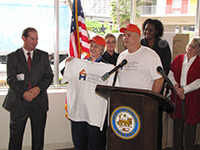 December 21 marks the longest night of the year. Each year in Houston, over 500 homeless people gather to pay homage to the men and women who have passed away living on the street. Volunteers, churches and other organizations chip in to provide food and toiletries for this night-long memorial.
December 21 marks the longest night of the year. Each year in Houston, over 500 homeless people gather to pay homage to the men and women who have passed away living on the street. Volunteers, churches and other organizations chip in to provide food and toiletries for this night-long memorial.
Frequent experiences like this continue to humble brother Gary Grier, Houston ’86, who is the project manager for the Homeless of Houston/Harris County. Grier’s path to his current job is just as interesting as the job itself.
Grier became a SigEp just after Texas Delta rechartered in 1984. “Quite frankly, I joined the Fraternity because I’m a team person and believe in community and family,” said Grier. He looks back fondly on his time in the chapter where he not only reminisces about singing and serenading with his chapter brothers but also the great leadership opportunities he had as member development chair and president. There, he learned key skills: enabling others to act, and knowing others’ strengths.
Grier pursued law school after graduation where he hoped to build on his passion for serving the community, and he eventually left Houston to work in a law firm. After a few years, Grier wanted to return to Houston, and while looking for a job back home, volunteered for the AIDS Foundation of Houston. They soon offered Grier a job as the program services director. He put his legal background to work teaching employment classes that covered working while earning Social Security and lessons on keeping a job while dealing with HIV/AIDS. He also coordinated various housing development programs tied to homelessness prevention as well as a food pantry called Stone Soup which had a profound impact on Grier.
While Grier was with the AIDS Foundation, he became director of a number of housing programs that were designed to prevent or end homelessness. That led to his next job with the Coalition for the Homeless of Houston/Harris County. Many people associate homelessness with aggressive pan handlers, but it comes in many forms such as chronic, youth and family homelessness.
The Coalition’s effort to determine the services needed by the homeless community helps to reduce the amount of overnight emergency services and break the cycle of homelessness. Through Grier’s leadership, the Coalition has developed an enhanced census called the Homeless Count. Volunteers, including people who were previously homeless, track down these folks who don’t even have a door to knock on. These accurate counts create detailed profiles on each homeless person to deliver more relevant, timely services.
Grier is passionate about preventing and eliminating homelessness. He feels rewarded when volunteers reach out to him weekly to thank him for the hands-on opportunities to work with the homeless community. He also takes great pride in the formerly homeless people who have turned their lives around and regularly express their gratitude.
Grier shared that, “When I got into my position, it was so empowering, because I was able to work with people who had all sorts of reasons why they’ve never been able to work, hold a job or other barriers. To see some people get their first job, by the end of the week sometimes, or to, later on, see them make a life change, has been rewarding to me personally.”









Leave a Reply